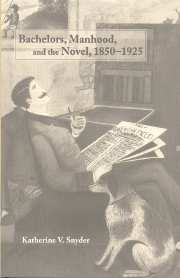Book contents
- Frontmatter
- Contents
- Acknowledgments
- Abbreviations
- Introduction
- Chapter 1 Trouble in paradise: bachelors and bourgeois domesticity
- Chapter 2 Susceptibility and the single man: the constitution of the bachelor invalid
- Chapter 3 An artist and a bachelor: Henry James, mastery, and the life of art
- Chapter 4 A way of looking on: bachelor narration in Joseph Conrad's Under Western Eyes
- Chapter 5 The necessary melancholy of bachelors: melancholy, manhood, and modernist narrative
- Afterword
- Notes
- Bibliography
- Index
Chapter 1 - Trouble in paradise: bachelors and bourgeois domesticity
Published online by Cambridge University Press: 22 September 2009
- Frontmatter
- Contents
- Acknowledgments
- Abbreviations
- Introduction
- Chapter 1 Trouble in paradise: bachelors and bourgeois domesticity
- Chapter 2 Susceptibility and the single man: the constitution of the bachelor invalid
- Chapter 3 An artist and a bachelor: Henry James, mastery, and the life of art
- Chapter 4 A way of looking on: bachelor narration in Joseph Conrad's Under Western Eyes
- Chapter 5 The necessary melancholy of bachelors: melancholy, manhood, and modernist narrative
- Afterword
- Notes
- Bibliography
- Index
Summary
“The Bachelor in Fiction” was hardly news when Percival Pollard published his review essay of that title in 1900. An 1859 Wilkie Collins sketch entitled “The Bachelor Bedroom,” published anonymously in the English periodical All the Year Round, indicates that as early as mid-century the bachelor in fiction had long been a conventional topic: “The bachelor has been profusely served up on all sorts of literary tables; but, the presentation of him has been hitherto remarkable for a singularly monotonous flavour of matrimonial sauce. We have heard of his loneliness, and its remedy, or his solitary position in illness, and its remedy; of the miserable neglect of his linen, and its remedy.” Deploring the monotonous insistence on marriage as the sole remedy for the ills of bachelor life, Collins asserts that there is “a new aspect of the bachelor left to be presented … a new subject for worn-out readers of the nineteenth century whose fountain of literary novelty has become exhausted at the source”:
But what have we heard of him in connexion with his remarkable bedroom, at those periods of his existence when he, like the rest of the world, is a visitor at his friend's country house? Who has presented him, in his relation to married society, under those peculiar circumstances of his life, when he is away from his solitary chambers, and is thrown straight into the sacred centre of that home circle from which his ordinary habits are so universally supposed to exclude him?
(p. 355)- Type
- Chapter
- Information
- Bachelors, Manhood, and the Novel, 1850–1925 , pp. 18 - 63Publisher: Cambridge University PressPrint publication year: 1999

